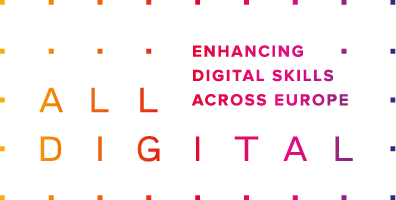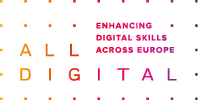
10 Mar ALL DIGITAL’s position on the proposed Council Recommendation on Individual Learning Accounts (ILAs)
10 Mar, 2022
Background
On 10 December 2021, the European Commission released a proposal for a Recommendation on Individual Learning Accounts (ILAs). The initiative was announced in the European Commission’s annual Work Programme for 2021 and is in line with actions set out under the European Skills Agenda and European Education Area. It is now up to the Council of the EU, specifically the Working Party on Social Questions, to discuss and formally adopt the text. The Recommendation on Individual Learning Accounts is thereby expected to be adopted under the programme of the French Presidency of the European Union, i.e. by end of June 2022.
Overview
The Individual Learning Accounts proposal recommends to Member States to provide annual individual training entitlements for every working-age adult residing in a Member State, following a universal approach, i.e. they should be designed in such a way that doesn’t exclude any proportion of the working age population. Additionally, and importantly, Member States are urged to adapt the associated funding to individuals’ specific needs. It is therefore a major step towards the improvement of the digital competences of European citizens, in so far that the principles set out in the ALL DIGITAL Manifesto for enhancing digital competences in Europe are reflected.
The Recommendation also calls for establishing public national registries of quality assured and recognised training, career guidance and validation offers, as well as the creation of a single national digital portal listing available training and support opportunities. Herein lies a key instrument to support and facilitate the essential work of ALL DIGITAL’s members in particular, and providers of digital competence trainings in general. It is crucial that there is proper recognition of non- and informal education and training as key factors in providing accessible, inclusive and flexible training offers, and that their essential role is adequately incorporated in the creation of the registries and the single portals. These instruments should not, under any circumstances, prioritise formal education over informal and non-formal education and training, and all types of education should be judged on similar quality and recognition criteria as requirements for being listed in the registries.
ALL DIGITAL Vision and Mission
ALL DIGITAL believes that every European should be able to exploit the benefits and opportunities created by digital transformation. We aspire to equip European citizens with digital skills, give them added confidence, and a mind-set that allows them to understand and benefit from the digital transformation of society. This is what drives us, what defines our priorities and what underlies the distinct role that our network plays in Europe.
ALL DIGITAL perspective on Individual Learning Accounts
There are two main considerations that inform ALL DIGITAL’s position on Individual Learning Accounts (ILAs). On the one hand, there is the digital skills gap, compounded by the – recent as well as continuing – arrival of new technologies and an ever-changing private and professional landscape. On the other hand, there is the risk of exclusion from training opportunities of those who need them the most. ALL DIGITAL believes that, given these two aspects, it is critical to ensure that the implementation of ILAs meets the very pressing needs of our time, in particular the digital divide and lack of basic digital competences among a large part (44% ) of the population. It is our view that solving the former depends on combatting the latter.
It may very well seem preferable to address the most pressing digital skill gaps through short-term measures which primarily reach those individuals with an already high degree of competences and proximity to education and the labour market for quick results. In the middle- to long-term such a strategy would, however, be highly unsustainable and inevitably fail. A core principle in the setup of ILAs should be designing personalised and outreach measures, following a lifecycle approach, which are tailored to the needs and requirements of those furthest from the labour market, education, and, most importantly, social participation.
ILAs have the potential to achieve precisely that, by incorporating a universal approach while taking into account inclusiveness and specificities in their adaptation to individual needs. ALL DIGITAL is pleased that the proposed Recommendation takes this approach and urges Member States to support and implement this proposal. It is, however, regrettable that the scope of the proposal extends only to working age adults, and thus excludes parts of the population who are in need of improving their competences to become and remain participating members of society. Individual learning and training entitlements for everyone in the EU, regardless of their professional or employment status, remove barriers to accessing quality education and training programmes, be those barriers based in economic constraints, discrimination, a lack of awareness of these opportunities or other. To be an efficient instrument, it is essential that Member States adequately promote these entitlements to ensure take-up.
Further, Member States must adequately support and fund the provision of quality education and training to achieve desired results. Special outreach measures need to be put in place, to ensure that vulnerable groups are not left behind. A key component will be facilitating the cooperation and support of private organisations, industry, and most importantly civil society organisations, who are often closest to those in need of education and training, while ensuring the quality and accreditation of the training offers provided.
It is regrettable that the proposal initially doesn’t consider transferability of entitlements between Member States and defers this matter to a subsequent review of the Council Recommendation. This makes it all the more important that Member States take transferability into account when setting out their own plans for National Individual Learning Accounts.
The proposal rightly refers to the need for quality, standards, and transparency as essential parts of the approach to ILAs. Equally, it is highly commendable that it recommends a universal approach to the provision of learning entitlements, while it is also calling for targeted measures which are adjusted to individual needs. This combination is a prerequisite for inclusion and accessibility. It is the only way that a true culture of lifelong learning can be developed in the EU, thereby contributing to the delivery of Principle 1 of the European Pillar of Social Rights and the implementation of the education headline target under the Social Pillar Action Plan.
ALL DIGITAL stands ready to work with stakeholders for the application of ILAs for the enhancement of digital competences and other skills, but only if – following the second key recommendation of our Manifesto, calling for inclusive access to education and training – this application is truly inclusive of all.
ALL DIGITAL
ALL DIGITAL is a leading pan-European association based in Brussels, representing member organisations across Europe that work with 20,000 digital competence centres.
We focus to support Europeans that have an insufficient level of digital skills. That means that they’re having less chances to find work, to use online services, to have a better quality of life, to be included in today’s society.
We believe that every European should be able to exploit the benefits and opportunities created by digital transformation.
For further questions, please get in touch with Norman Röhner, ALL DIGITAL Policy Officer, at norman.rohner@all-digital.org








